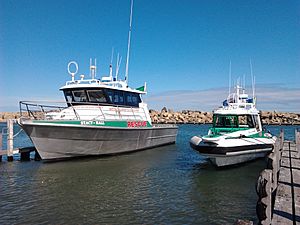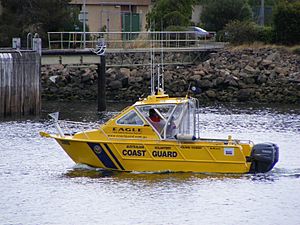Coast guards in Australia facts for kids
Unlike some countries, Australia doesn't have one single group called the "Coast Guard." Instead, keeping Australia's huge coastline safe is a team effort. Different groups from the national government, state governments, and even community volunteers work together. They all help protect the seas, rescue people, and make sure everyone follows the rules on the water.
These groups include the Maritime Border Command, which is the main sea patrol force, along with other important agencies and many dedicated volunteers.
Contents
National Government Teams
The Australian government has several key agencies that handle coast guard duties across the country.
Maritime Border Command
The Maritime Border Command is the main group that acts as Australia's coast guard. It's a special team made up of members from the Australian Defence Force and the Australian Border Force. This includes sailors from the Royal Australian Navy, pilots from the Royal Australian Air Force, and officers from the Border Force's ships and planes.
Their job is to protect Australia's waters and its 19,650-kilometer coastline. They watch out for problems like:
- Illegal fishing
- People trying to harm the environment
- Attacks on ships or piracy
- The spread of pests or diseases from other countries
- Pollution in the ocean
The Australian Federal Police also helps the Maritime Border Command with investigations and enforcing the law at sea. In 2021, the command tested a new type of robot boat, called an unmanned surface vehicle (USV), to see if it could help spot small boats that might be a threat.
Australian Maritime Safety Authority
The Australian Maritime Safety Authority (AMSA) is in charge of making sure ships are safe. They check both Australian and foreign ships in the country's waters.
AMSA's jobs include:
- Managing navigation aids like lighthouses and buoys
- Running the Australian Rescue Coordination Centre
- Organizing search and rescue missions for ships or planes in trouble
- Making sure Australia follows international sea safety rules
Australian Fisheries Management Authority
The Australian Fisheries Management Authority (AFMA) looks after Australia's fish populations. They make sure that fishing is done in a way that is sustainable, meaning there will be fish for many years to come. AFMA also works to stop illegal fishing in Australian waters.
State Government Teams
Each state in Australia also has its own agencies that help keep their local coastlines safe.
Queensland
In Queensland, Marine Rescue Queensland is part of the Queensland Police Service. This group is responsible for sea safety and rescue operations along the state's coast.
Western Australia
Western Australia has the longest coastline of any state. Here, local search and rescue is managed by the West Australian Police. They work with many local volunteer groups known as Marine Rescue WA. These groups are part of the Department of Fire and Emergency Services (DFES) and are key to responding to emergencies at sea.
Community Volunteer Groups
Many brave volunteers give their time to help keep the coasts safe. These groups act as extra search and rescue teams and teach people about boating safety. They do not have police powers but play a vital role in saving lives.
Marine Rescue NSW
In 2009, several volunteer groups in New South Wales joined together to form Marine Rescue NSW. This created one large, organized team for the state. It is a charity, similar to the Royal National Lifeboat Institution (RNLI) in Great Britain.
With over 3,000 volunteers and 44 units along the coast, Marine Rescue NSW provides radio monitoring and rescue services. The state government helps fund them by adding a small fee to boat licenses and registrations. This money is used to buy new, modern rescue boats and equipment.
Australian Volunteer Coast Guard
Established in 1961, the Australian Volunteer Coast Guard was inspired by the US Coast Guard Auxiliary. It is made up entirely of volunteers. Their motto is to guard the coast first through education and then by search and rescue if needed.
The Coast Guard has groups all the way from northern Queensland down to South Australia and Tasmania. They have over 100 rescue boats and more than 140 radio bases to listen for boaters in trouble.
Royal Volunteer Coastal Patrol
The Royal Volunteer Coastal Patrol was the oldest of these volunteer groups, started in 1937. It was created by yachtsmen who wanted to help the Royal Australian Navy.
During World War II, its members helped guard important sites like wharves and bridges. After the war, their main job became civilian search and rescue. In 1974, Queen Elizabeth II allowed them to add "Royal" to their name. In 2010, the patrol's New South Wales units joined with other groups to become Marine Rescue NSW.
Should Australia Have One Coast Guard?
For many years, people have talked about creating a single, official Australian Coast Guard. In 2001, politician Kim Beazley and the Australian Labor Party suggested this idea. They said one group could handle all sea protection duties, from stopping illegal immigration to managing fisheries.
However, others disagreed. Some critics said a new, single coast guard would be very expensive to set up. They argued that the current system of different groups working together was effective. The idea has been discussed several times, but for now, Australia continues to use its team-based approach to protect its shores.
 | Dorothy Vaughan |
 | Charles Henry Turner |
 | Hildrus Poindexter |
 | Henry Cecil McBay |



